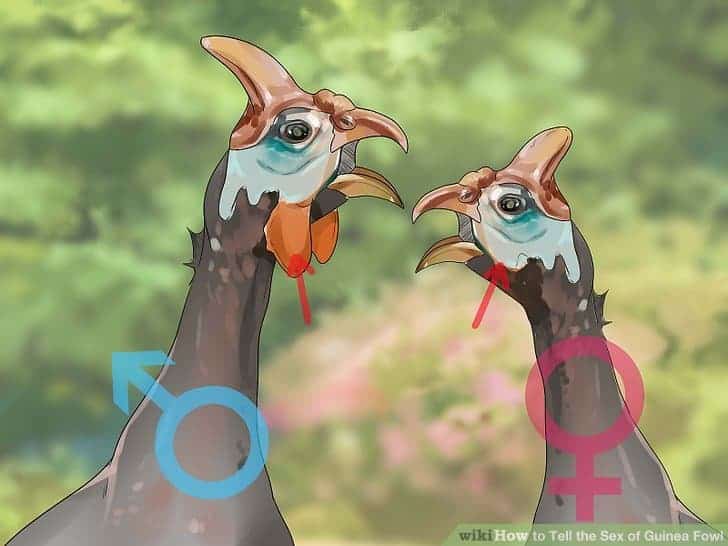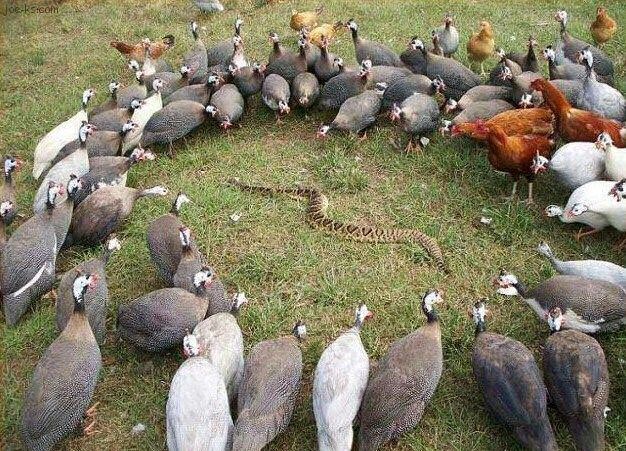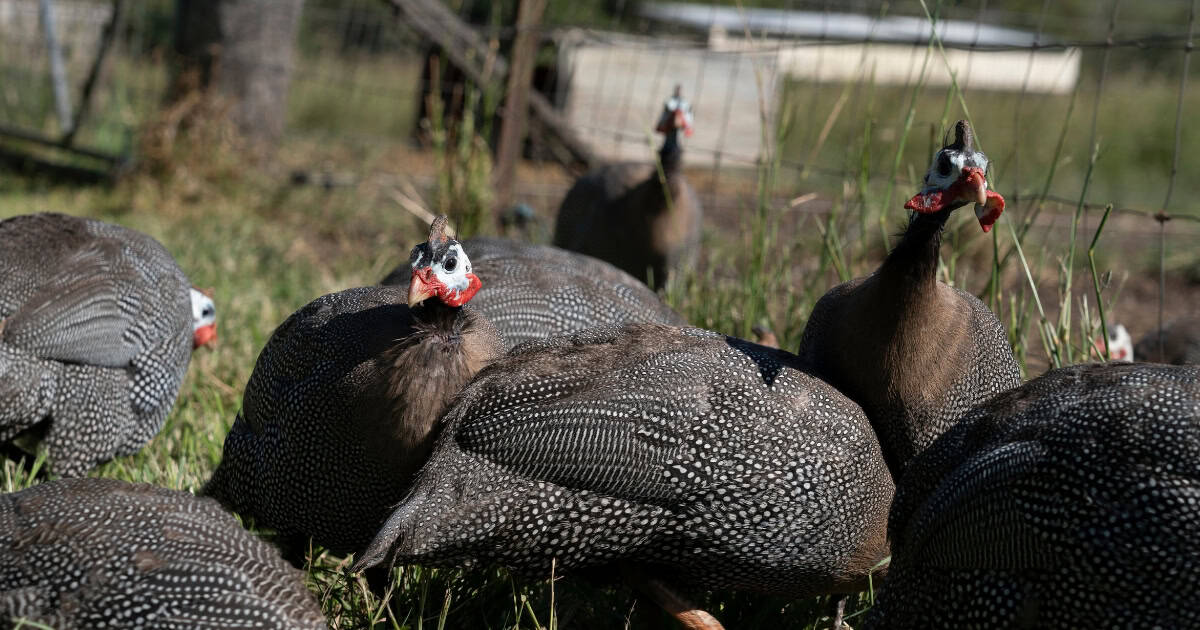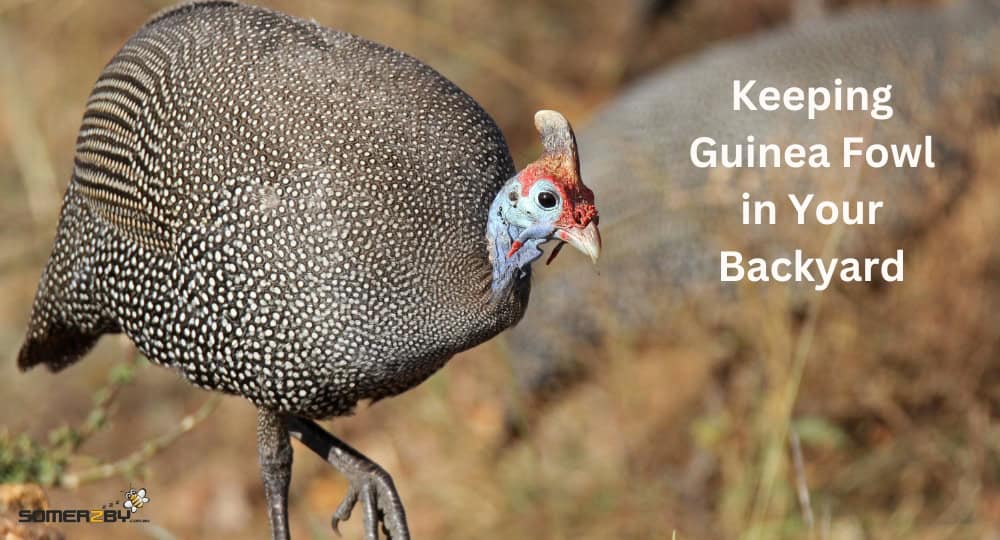Guinea Fowl
Keeping Guinea Fowl – The Ultimate Guide For The Australian Backyard
Guinea fowl might be a strange-looking bird but they’re becoming increasingly popular in Australian backyards and lifestyle blocks.
Many people love their Guinea fowl because the birds are just so loveable and full of personality.
But Guinea fowl aren’t for everyone and you need to think about how well they’ll fit your situation.
To answer your questions about these marvellous birds we’ve put together the ultimate guide to keeping Guinea fowl.
Keeping Guinea Fowl
Guinea fowl are native to the West Coast of Africa but the distinctive polka dot plumage, bald helmeted heads, and their bottomless bug munching appetites are earning the birds some real fans in Australia too.
They’ll demolish all the garden pests for you but because they are generally surface feeders they tend not to scratch or uproot established garden plants (be wary about letting them loose amongst your young veggie seedlings though).
Guinea fowl are generally too independent to make cuddly pets but their personalities and antics are highly entertaining and many people love them for their quirks.
Guinea Fowl & Insect Control
Guinea fowl are a hit with gardeners thanks to their voracious appetite for demolishing bugs and pest insects in the garden.
But Guinea fowl are also popular because their loud warning cries serve as a perfect alarm system against predators such as snakes or foxes and they will also let you know when people come to your property.

The Difference Between Male and Female
It can be difficult to tell males and females apart because their adult plumage is identical.
The male’s helmet and wattles tend to be larger than the females but the easiest way to distinguish them is by their calls.
Guinea Fowl Noise
Guinea fowl noise is loud and they do like to make nuisance noise for no apparent reason.
This could be an issue with neighbours especially at night.
Guinea Fowl Sounds
The males make a one-syllable chi-chi kind of sound whereas the females produce a distinctive two-syllable call.
There are several varieties of Guinea fowl but the most common are; lavender, pearl, and white.
What Does Guinea Fowl Meat Taste Like?
Guinea fowl will grow to weigh 1 kg or more and their flesh is very tasty, somewhat similar to pheasant.
Guinea meat is richer tasting than chicken meat with the added bonus of having less fat and fewer calories.
Guinea Fowl in Australia
Most Australian councils class Guinea fowl under the same regulations as chickens.
Generally you can keep up to a maximum of 15 Guinea fowl in most NSW urban council jurisdictions.
Rules vary from State to State so for example, in Logan, Queensland, you can keep up to 6 without a permit on a 1,000m2 section.
Guinea fowl are highly sociable birds and you should aim to keep at least four to six birds.
There are also strict rules relating to placing coops and runs at minimum distances from neighbour’s boundaries.
You need to check with your local council before you add Guinea fowl to your family.
Pros and Cons of Keeping Guinea Fowl
What are the pros and cons of keeping guinea fowl?
Guinea fowl tend to divide people into two camps: love ‘em or hate ‘em.
You could say that Guinea fowl have a real presence and if you live in a rural area with plenty of free ranging space that may not be a problem.
But if you live with close neighbours you might want to think carefully about how your Guinea fowl will fit in.
Guinea fowl have some wonderful qualities but check out our pros and cons list to see if they’re the right bird for you.
Pros for Keeping Guinea Fowl:
- They are the pest insect and bug blasters supreme.
They will march as team through your garden like a well-oiled killing machine in a relentless hunt for caterpillars, ants, ticks, slugs, and even mice and sometimes rats and snakes.
They can eliminate the need for toxic garden sprays almost entirely and they’re generally much easier on your plants than chickens.
- They are an excellent alarm system and will loudly warn you of any intruding predators, animals or people.
They will even attack some predators such as rats and snakes.
- Guinea fowl are low maintenance.
They’re tough and will survive in a wide range of climates.
They don’t need so much feeding either, provided you have a large enough area for them to roam and get their daily bug boost.
- Guinea fowl have strong personalities.
Many people find their behaviours extremely attractive.
Their crazy antics, the fiercely protective love between a cock and his hen, and the constant chattering communication throughout the flock have won many converts.

Cons for Keeping Guinea Fowl:
- Guinea fowl are LOUD.
And the will create a real din for no apparent reason.
This could be an issue with neighbours.
Yes, they will warn you if a snake comes onto the property but they will also let you know that it’s sunny, raining, or that it’s just seen its own reflection in a puddle.
- Guinea fowl will travel.
They have no respect for boundaries, roads, cars, council regulations or really anything else.
They may roost in your neighbour’s trees, terrorise their cat or scratch their shiny new car.
- They can be aggressive.
But not so much towards people, but they will often bully your chickens and beat up the rooster (if you have one).
They don’t make cuddly pets although they will become more sociable and friendly if they’ve been raised with chickens and other animals or handled from very young.
- Guinea fowl sometimes appear to have non-functioning brains.
They think nothing (quite literally) of taking on cars or trucks and will fight their own reflections to the death.
But then many people actually find this personality quirk extremely endearing.
Here are some commonly asked questions that will help you decide if Guinea fowl are suitable for your needs and situation.
Guinea Fowls and Snakes
Will guinea fowl kill or eat snakes?
There is plenty of evidence to suggest that they will surround, harass, deter, and even kill small snakes, but it’s unlikely that they will eat the snake.
Guinea fowl are great snake deterrent and do a great job of keeping the snake away, and the at the very least they will warn you that snakes are around.
Do Guinea Fowl Need a Coop?
It’s not necessary…
… but it is best to keep your Guinea fowl in a coop.
Will guinea fowl fly away and will they come back?
Yes, they do fly and will often fly up into trees or rooftops to roost. You can clip their wings, and this will restrict their flying.
But it’s important to train them from young to think of the coop as home. This ensures that they will return when they do go wandering.
When releasing young Guinea fowl from the coop for the first time, do it one at a time. Their strong flock mentality will ensure that the loose ones will stay close to the coop.
Eventually they will all learn that the coop is home.
Chicken Coop with Run | Large Chicken Coop | Coop and Run Packages | Feeders
Will Guinea Fowl Get Along With Chickens?
Yes and no.
Guinea fowl and chickens do frequently co-exist reasonably peacefully.
But be aware that Guinea fowl will rule the roost and may bully your chickens although this behaviour is usually much less severe if the Guinea fowl have been raised with chickens.
Providing separate coops and runs can offer a good solution too.
Keep roosters and male Guinea fowl separate.
Will Guinea Fowl Protect Chickens?
Yes, indirectly at least.
Guinea fowl will chase and eat many predators that would otherwise harm your chickens including snakes, mice and rats, and their fearsome din will often scare off larger predators too.
Will Guinea Fowl and Chickens Cross Breed?
Yes, guinea fowl and chickens will occasionally cross breed but the resulting offspring will be sterile.

Will Guinea Fowl Eat Chicken Feed?
Yes, you can feed them the same kinds of food as you do your chickens but if your Guinea fowl are ranging freely you won’t need to give them so much.
Will Guinea Fowl Eat Fire Ants and Ticks?
Yes, guinea fowl love munching on all the creepy crawlies in your garden and they’ll get rid of the pests with minimal damage to the greenery.
Guinea Fowl Eggs
Will guinea fowl lay eggs and sit on their eggs?
Yes, Guinea fowl lay eggs in-season. It’s usually once a year and a hen will lay around 100 eggs.
The eggs are smaller than chicken eggs but the shells are much tougher. The eggs contain more a higher proportion of yolk to white and are very tasty.
Try to encourage Guinea fowl to lay their eggs inside the coop. If they are allowed to lay them outside you will have a hard time finding them because they conceal the nests in the most cunning ways.
Guinea fowl are not renowned for being great mothers and will not necessarily sit on the eggs until they all hatch. The eggs will take around 26 to 28 days to hatch and you can use a broody hen or incubator if the mother is not really interested.
The young keets (youngsters) are very feisty and agile so you’ll need to keep them in an escape proof pen. Make sure they have a non-slip surface to run around on because their legs are still quite fragile.
Will Guinea Fowl Survive Winter?
Yes, Guinea fowl are extremely hardy and will cope with the whole range of Australian climates.
In fact, they seem to cope with the winter cold, rain, frosts and snow better than many chicken varieties.





I have had 3 guinea fowl for some years. Today I found all three about 3 ft from each other – all against the wire fence around the chook pen. (on the outside of the pen) all dead. There are no obvious marks on them one had blood around the beak area, but the other two looked okay. There is a bat colony not far from our boundary could that have any bearing on what has happened? They were running around happily this morning – it just seems odd that all 3 have gone at the same time so close together. If it was a snake there is no sign of it trying to swallow them. Any suggestions would be appreciated. Thank you Irene Boyd
I’ve heard that possums can do this
Are there any pure White Guinea Fowl in NSW
Hi there, A friend has a sick young guinea fowl – tremors, weakness in legs, not growing. Any thoughts on what this might be?
Could be retained egg yolk. I had a keet with failure to thrive, got worse and worse, mostly oblivious to surroundings. Basically nothing can be done as they are rotting from the inside.
Great website with lots of good information. Love the sense of humour too!
How long do Guinean Fowl live please?
Are Guinea Fowl a threat to native birds or other wildlife?We are on acreage so if we adapted Guinea Fowl should we keep them in a chicken coup or let them roost wherever they like? The neighbours are about 70 metres to one side of our property. And if we use the coop should we keep them locked up for a few days to allow them to get used to it as their home?
thanks for any input in advance.
I’d love to know the answer to Glenyss question. If I get guinea fowl will tbey attack or bully the native birds?
I have 5 guinea fowl and they get along with the native birds very well. We have dozens of lorikeets, crested pigeons, galahs, cockatoos and parrots visit daily, the guineas forage around under the bird feeders with them, but really don’t take any notice of them. On the other hand, although they grew up with the chickens, we have now separated them as the male guineas continually chase them.
You will need to keep your guineas in their coop/run for at least 4 weeks, so they know that is home (we have a very large run so kept ours in for 3 mths) otherwise they will go as soon as you let them out. I suggest you shake their feed tin or use the same call each time you feed them so they learn when to come back into the coop each night
I have a neighbour with guinea fowl in suburban Brisbane. They are an absolute pest and attack the blue tongue lizard population we have here.
If you don’t have acreage, these are not the birds for you
I have seen 3 of these birds in the bush someone must have dumped them . how do I save them and will they be ok in the wild?
Hi Fern,
I recommend contacting your local rescue group or animal shelter to assist.
I have had a pair of guinea fowl for just over 3 years, two best friends and quite tame to humans, both female birds.
They have always couped together of an evening, like clockwork they will return from foraging around 6pm and ask to be fed and put away and for the last three years will disappear for a month (around christmas), to lay eggs. They nest close to the house on our acreage, will return briefly for food and water but return to this nest at night…about a month later they return to the coup permanently.
I have found these nests to contain about 20-30 eggs.
Anyway today only one bird returned, I found their nests close together, but unfortunately found the remains of a carcass dragged away from the nest, I suspect a feral cat or quoll.
My question is what to do for the remaining bird, can I pair her with a young bird (12 weeks), or should I find her an adult bird, as she is clearly fretting
Can I introduce a lone female laying age into a new flock without issue to her or others
I have one female I want to get her some mate, what ratio as female to males is needed to keep them happy?
i have two guinea fowl that have been sitting on eggs for about two months. I am worried about their health. Should I remove all the eggs and hope she doesn’t stay clucky?
When were Guinea Fowl first introduced into Australia? And roughly how many are there now? Thanks
Are lavender Guinea fowl hard to find
When can you release the young Guinea fowls to roam they are 6 weeks
I have had 5 fowls 1 has died Dont know how Cant see any evidence There is a dominant fowl who chases others 1 at a time from the group. Is this part of the mating process or dominance for the top position I cant tell if they r male or female because when they start their noise its all together!,
When I bought my 5ac slice of heaven, I inherited 12 guineas (we refer to them as The Flock) & a coop with run, not a really good condition one & unfortunately it has deteriorated with time. But the coop is still fine and well made. We’re now down to 3, we don’t talk about the others it just depresses me.
Number 4 is the only one I definitely know what happened & that was I finally went away for a couple of nights and it left home and moved into the new neighbour’s place, they love it so that’s fine. What have I learned, they are wonderful silly ridiculous creatures of habit. They thrive and rely on routine, even if they don’t listen to you they do, fresh water each day is a must, a little feed at the same time in the arvo, extra in rough weather ( heavy constant rain, long dry periods anything that causes the lack of insects), do not let their coop or run get overrun with grass or weeds they like to be able to feel safe in the enclosure even if they don’t bloody stay there, a good large tree close by (for sitting in & viewing from), don’t use netting they get themselves tangled up ludicrously in it and then panic like crazy, prepare for eggs to be anywhere at anytime & they’re lousy parents after the main event forget the hatching part. Free range for them is a lifestyle choice not a human decision, so also don’t be surprised where you find them. They love to be talked to especially with anything you can manage that sounds close to the noise they make, because they constantly chat comfy little birb clucky things at each other.
It’s the tone of your voice & the sounds you make that let them know it’s you they respond & depend on. They are stoopid silly ridiculous birbs, who haven’t got a clue what’s going on, but as lovable funny and wonderful as any animal you’ll ever meet. If you love them you won’t care if they don’t give you eggs or end up on your table, you’ll just be happy the silly things are there. After 7yrs my home wouldn’t be right without them and they truly love reliable, regular day to day existence, otherwise they will leave………
I started as a novice with 13 Guinea fowl on our farm, kept them locked up for 3wks, then let them out one at a time over a period of another 2wks. Sadly the ones that flocked-off were taken by foxes or feral cats & my dogs also got a couple until I trained them not to chase them. In the end I only had 1 male left who was very lonely, so I got 4 teenager keets. He’s been so protective & nurturing toward them & I’m loving seeing them strut around my backyard in Indian File. I also put eggs under a clucky hen that hatched at Christmas time. These 4 keets are in the old bird aviary in the backyard & the other 5 come back & check on them. I’m hoping that as the last 4 keets have been hatched & held onsite that they’ll use the aviary as a copp when I free them. The others all roost in a nearby tree at night. I love them !!
I have two guinea fowl a male and female and I let them out there coop every morning , my problem is the male keeps changing at me and attacking me and my wife and mother, I don’t know what to do to get him to stop or why he is doing this ? Can anyone tell me what I can do to get him to stop charging people ? Or why he is doing this ?